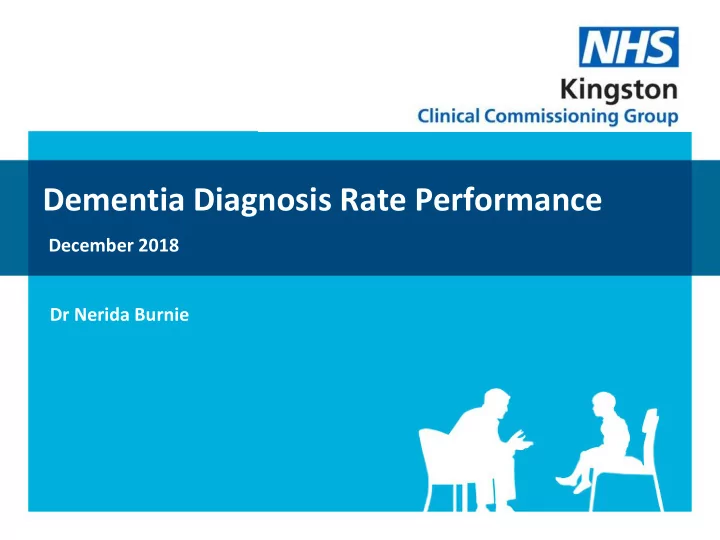

Dementia Diagnosis Rate Performance December 2018 Dr Nerida Burnie
Performance mapped to actions The estimated diagnosis rate for people aged over 65 years with dementia target is the number of people diagnosed with dementia as a proportion of the expected prevalence of dementia. The national target is 66.7%, which has not been achieved since September 2015, and has worsened from that point. The chart above shows the monthly performance against the prevalence (NHS Digital have calculated this from April 2017), with actions taken mapped onto performance. A clinical reviewer continues to support practices in identifying patients from practice lists, and maintaining a list of potential people who are being monitored.
Is Expected Prevalence Rate too High in Kingston? The estimated prevalence of dementia as a proportion of people aged 65 or over is shown in the chart to the right. Those CCGs meeting the dementia standard are shown in green, whereas those CCGs that are not meeting the dementia standard are shown in orange. Kingston CCG is shown in red. The proportion in Kingston (6.4%) is higher than the national average (6.37%), although as can be seen from the chart, there are CCGs meeting the 66.7% who have a proportional expected prevalence rate well above Kingston’s (and CCGs with much lower proportional prevalence who are not achieving the standard).
Is the Low Rate due to Care Homes Coverage? The chart to the right shows the older people’s nursing and residential home beds across South West London as a rate per 1,000 65+ year population, so that the areas can be benchmarked. This demonstrates that the nursing home beds within the borough of Kingston are above the rate for South West London, and the total number of care home beds are similar to Wandsworth and Sutton All other CCGs are achieving the dementia diagnosis target. South West London is achieving the dementia diagnosis as an STP. (Care Home data sourced from MacMillan)
Actions completed to date: • Memory Nurse – case finding at GP surgeries • Follow up of patients discharged from Kingston Hospital • Regular coding review of practices • Visits to all GP surgeries to discuss actions • Including care home assessments, MCI annual review, those not seeing GP in >18 months, at risk • Close working with Memory Assessment Service (MAS) • Meetings with Kingston Hospital consultants in relevant fields • Plan trial of direct referral from Kingston Hospital to MAS • Reduce DNA rates through memory assessment process • Consider pre assessment counselling with Alzheimer’s society • Support for carers/family to attend appointments • Discuss with KH staff about patients with Parkinson’s Disease
Actions to prioritise: • Care home project – revisiting and completing more assessments as needed at the care homes who didn’t participate last time • Education sessions at the GP half day training to remind about the importance of timely diagnosis • Explore the search public health have completed regarding reducing stigma to see if it helps diagnosis rates in an area (including considering hard to reach groups in communities) • Continue joint working between primary care, mental health services and hospitals Multifactorial problem which requires ongoing work in various ways
Recommend
More recommend